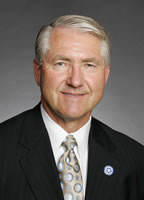In order to provide equal access and equal opportunity to people with diverse abilities, this site has been designed with accessibility in mind. Click here to view
Senate Approves Task Force to Help State's At-Risk Youth Become Productive Adults
 Sen. Harry Coates
Sen. Harry Coates
The Senate unanimously approved legislation Tuesday to create a task force to find solutions to help Oklahoma's at-risk youth become independent, productive adults. Senate Bill 283, by Sen. Harry Coates, would create the Task Force on Youth Transitioning into Adulthood.
"We have thousands of Oklahoma youth with mental health challenges or who have been in state custody either through the juvenile justice or child welfare systems. While we offer a variety of programs including educational, drug treatment, mental health, rehabilitation and medical services to help these at-risk teens, all of those programs stop when these individuals age out of the system," said Coates, R-Seminole. "Studies show that without continued assistance, these people, for the most part, will not become productive citizens but will rather continue to be a drain on society, and we want to find a way to change that."
The task force would study policies and programs to assist youth as they transition into adulthood through education, behavioral health, social services, housing, and employment services. The youth to be studied would include those who are currently in or are preparing to exit the juvenile justice or foster care system or who experience conditions in their daily lives that place their healthy, safety, physical and mental health at risk. The task force would look at issues like financial independence, life skills, transportation that directly impact their ability to transition into adulthood.
"Depending on the level of care, the financial investment by the state can range from $8,260 for a young person in foster care for one year to over $108,000 for one in juvenile institutional care,” said Coates. “Oklahoma’s investment will be squandered if we don’t ensure a productive transition for these adolescents into the job market, stable housing and independent living.”
SB 283 is part of the 2009 Legislative Agenda for Children and Youth promoted by the Oklahoma Institute for Child Advocacy.
The measure will now be heard in the House.
 Oklahoma Senate
Oklahoma Senate

